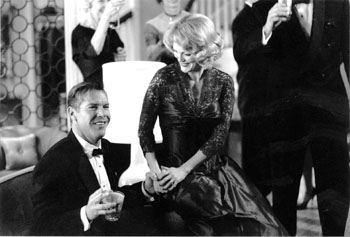![[Metroactive Movies]](/movies/gifs/movies468.gif)
[ Movies Index | Show Times | Silicon Valley | Metroactive Home | Archives ]
Cocktail Hour: Julianne Moore and Dennis Quaid put a good face on their failing marriage in 'Far From Heaven.'
Autumn Leaves
If only costume and art direction were everything, Todd Haynes' 'Far From Heaven' would be celestial
By Richard von Busack
FALL HAS brought us a bumper crop of movies soaking in the era of the Hollywood studios; it's been film-geek city with the MGM chiffon of Punch-Drunk Love and 8 Women. Now comes the most elaborate pastiche yet: Todd Haynes' Far From Heaven, which attempts to re-create the colors, mood and melodrama of the autumn leaf blowers director Douglas Sirk turned out in the 1950s.
Sirk (1900-87) did his share of genre work, including detective and Western movies. He's best known, however, for his women's pictures, such as his class-conflict romance All That Heaven Allows (1955) or his tragic-mulatto drama, the remake of Imitation of Life (1959). Sirk's influence can be seen everywhere from Fassbinder's melos to John Waters' carnivals of crime.
Haynes (Velvet Goldmine, Safe) has spun his film off the race relations of Imitation of Life and the romance between an affluent woman and a man of the soil in All That Heaven Allows (in which Rock Hudson plays a tree surgeon). Far From Heaven does seem like a Sirk movie for a new century--the same satiny style but with more adult subject matter.
Julianne Moore plays Cathy Whitaker, a housewife in suburban Connecticut in the late 1950s. She has two children, who are as perfectly kept and perfectly ignored as those in a sitcom: a girl taking ballet lessons; a son whose big problem in life is forgetting to wear a jacket outdoors. Her husband, Frank (Dennis Quaid), pushes himself too hard at the Magnatech company, which manufactures TV sets.
This elegant life starts to fray when Frank begins arriving late for dinner and drinking too much. As we follow him, we're privy to his unspeakable secret: he's drawn to other men. Frank wrestles with this "sickness" through booze and visits to a doctor. Meanwhile, Cathy befriends her gardener, Raymond (Dennis Haysbert), who is kind, strong and thoughtful--and black. This friendship is much commented on by the neighbors. Raging gossip adds to Frank's angst.
Far From Heaven functions in part as a kind of costume drama. Moore is arrayed in a dozen chic scarves and dresses, all tuned to the almost-clashing pastels of the interiors. Like Donna Reed on a TV Land rerun, Cathy seems to dress formally for breakfast.
Sandy Powell's costumes are glamorous but deliberately stiff. Films in the 1950s starred actors bred to uncomfortable clothes, as today's performers aren't. This discomfort--Moore always seems to be wearing a girdle--adds a layer of meaning to Far From Heaven, but it also adds a layer of rigidity. The film might as well have been acted by Japanese actors wearing kimonos.
Haynes' use of flora for mood--the buckets of crimson and orange leaves; the symbolic, hopeful cherry blossoms--seems Japanese, too. Of any recent feature, Far From Heaven most resembles Wong Kar-Wai's Hong Kong film In the Mood for Love. As is the case with Kar-Wai's film, tears would be too vulgar a response to this carefully wrought ambience.
All praise is due to Moore and Quaid. Sirk's melodramas were never quite this well cast. It's a mark of Moore's talent that you're never tempted to laugh at her quaintness. Still, Haysbert faced the most difficult task--after all, he didn't have old movies to model his character on. His Raymond is so effortlessly dignified, it's as if he's only heard of the existence of racism as a troubling rumor.
This is an extravagantly beautiful film, including exhaustive contributions by production designer Mark Friedberg, who worked on the similarly dense The Ice Storm. Elmer Bernstein deliberately forgot everything he's learned over the past five decades in order to reproduce that old-time Hollywood bombast and sweetness.
Despite all this remarkable craft, I found it impossible to be swept away on these torrents of unspoken emotion. It sure gives you a turn seeing the age you were born into treated as if it were as far away as Elizabethan England. In reality, a person of today can return to the ambience of the 1950s without much effort. In our suburbs, you can still see much '50s architecture. Read John Cheever's short stories or the recently reprinted The Man in the Gray Flannel Suit, and you'll recognize many of the strands that tie that time to ours.
These strands are severed by Haynes to make the past seem more estranged. You're meant to see Far From Heaven and think, "It's been a long time since the 1950s; how the world has changed." Actually, the right comment is: it's been a long time since the existence of a world that never existed, except on Hollywood sound stages. The crack between Haynes' formalism and modern issues is always visible. You can see Haynes' point, but the point doesn't pierce the heart.
[ Silicon Valley | Metroactive Home | Archives ]
![]()

David Lee
Far From Heaven (PG-13; 107 min.), directed and written by Todd Haynes, photographed by Edward Lachman and starring Julianne Moore, Dennis Quaid and Dennis Haysbert, opens Friday at selected theaters valleywide.
Send a letter to the editor about this story to letters@metronews.com.
From the November 14-20, 2002 issue of Metro, Silicon Valley's Weekly Newspaper.